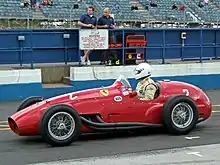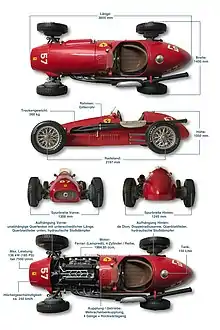 | |||||||||
| Category | Formula One | ||||||||
|---|---|---|---|---|---|---|---|---|---|
| Constructor | Ferrari | ||||||||
| Designer(s) | Aurelio Lampredi | ||||||||
| Predecessor | 212 | ||||||||
| Successor | 553 | ||||||||
| Technical specifications[1] | |||||||||
| Chassis | Single-seater, tubular frame | ||||||||
| Suspension (front) | Double wishbones, transverse semi-elliptic leaf spring, lever arm shock absorber | ||||||||
| Suspension (rear) | De Dion axle, twin-trailing arms, transverse semi-elliptic leaf spring, lever arm shock absorber | ||||||||
| Axle track | Front: 1,308 mm (51.5 in) Rear: 1,245 mm (49.0 in) | ||||||||
| Wheelbase | 2,197 mm (86.5 in) | ||||||||
| Engine | Lampredi 1,984.86 cc (121.1 cu in) L4 naturally aspirated, front engine, longitudinally mounted | ||||||||
| Transmission | Ferrari 4-speed manual | ||||||||
| Weight | 560 kg (1,230 lb) dry | ||||||||
| Fuel | Shell | ||||||||
| Tyres | Pirelli Dunlop Englebert | ||||||||
| Competition history | |||||||||
| Notable entrants | Scuderia Ferrari Ecurie Rosier Ecurie Francorchamps Scuderia Centro Sud | ||||||||
| Notable drivers | |||||||||
| Debut | 1952 Swiss Grand Prix | ||||||||
| |||||||||
| Drivers' Championships | 2 | ||||||||
| n.b. Unless otherwise stated, all data refer to Formula One World Championship Grands Prix only. | |||||||||
The Ferrari 500 was a Formula 2 racing car designed by Aurelio Lampredi and used by Ferrari in 1952 and 1953, when the World Championship was run to F2 regulations.
Racing history
For 1952, the FIA announced that Grand Prix races counting towards the World Championship of Drivers would be run to Formula 2 specification rather than to Formula 1, after the withdrawal of Alfa Romeo from the sport. Ferrari were the only team to have a car specifically designed for the new formula. The car was powered by an inline four-cylinder engine which was mounted behind the front axle, improving weight distribution. Alberto Ascari used the car to win his first world championship, winning all but one race with the simple 500. The race he missed was because he was driving the 4.5-litre Ferrari at the Indianapolis 500, however Ferrari won the race he was absent from as well. The following season, Ascari won his second world championship, and Ferrari won all but the final race, which was won by Juan Manuel Fangio, back in racing after an accident which had damaged his neck.
Ascari won seven consecutive World Championship races in the 500, a record which stood until Sebastian Vettel broke it in 2013. If the 1953 Indianapolis 500 (which was run to a different formula, and in which Ascari was not entered) is discounted, the run is extended to nine.
625 F1
For the 1954 season and the return to Formula One engine regulations, Ferrari 500 chassis were modified for the new regulations with the 2.5-litre 625 engine and would win two more races, one each in 1954 and 1955, although it was not quite fast enough compared to the Mercedes-Benz W196 and Maserati 250F. Despite two new models appearing during this period the 625 was not completely replaced until 1956 when Ferrari began using the D50 chassis Ferrari purchased along with the Lancia Formula One team.[2] In May 1955, Maurice Trintignant had won the Monte Carlo GP for the first time for Ferrari.[3]
The 625 F1 Lampredi inline-four engine displaced 2498.32 cc and could produce between 210–230 PS (154–169 kW; 207–227 hp) at 7000 rpm with two Weber 50DCO carburettors. The car had an independent front suspension and de Dion axle at the rear. Transverse leaf-springs and Houdaille hydraulic shock absorbers were used on both ends.[2]
- 1954 Ferrari 625 F1



%252C_Bj._1954.jpg.webp)

Technical data

| Technical data | 500 F2 | 625 F1 |
|---|---|---|
| Engine: | Front mounted 4-cylinder in-line engine | |
| displacement: | 1985 cm³ | 2498 cm³ |
| Bore x stroke: | 90 x 78 mm | 94 x 90 mm |
| Compression: | 13.0:1 | |
| Max power at rpm: | 185 hp at 7 500 rpm | 210 hp at 7 000 rpm |
| Valve control: | Double Overhead Camshafts, 2 valves per cylinder | |
| Carburetor: | 2 Weber 50 DCO | |
| Gearbox: | 4-speed manual, transaxle | |
| suspension front: | Double cross links, transverse leaf spring | |
| suspension rear: | De Dion axle, double longitudinal links, transverse leaf spring | |
| Brakes: | Hydraulic drum brakes | |
| Chassis & body: | Oval tube frame with aluminum body | |
| Wheelbase: | 216 cm | |
| Dry weight: | 560 kg | 600 kg |
| Top speed: | 260 km/h | 270 km/h |
Partial Formula One World Championship results
(This table contains results of Ferrari works cars; privateer results can be found here)
(key) (results in bold indicate pole position; results in italics indicate fastest lap)
| Year | Chassis | Engine | Tyres | Driver | 1 | 2 | 3 | 4 | 5 | 6 | 7 | 8 | 9 | Points | WCC |
|---|---|---|---|---|---|---|---|---|---|---|---|---|---|---|---|
| 1952 | 500 | 500 2.0 L4 | P | SUI | 500 | BEL | FRA | GBR | GER | NED | ITA | n/a1 | n/a1 | ||
| Giuseppe Farina | Ret/ Ret2 |
2 | 2 | 6 | 2 | 2 | 4 | ||||||||
| Piero Taruffi | 1 | Ret | 3 | 2 | 4 | 7 | |||||||||
| Andre Simon | Ret2 | 6 | |||||||||||||
| Alberto Ascari | 1 | 1 | 1 | 1 | 1 | 1 | |||||||||
| Luigi Villoresi | 3 | 3 | |||||||||||||
| 1953 | 500 | 500 2.0 L4 | P | ARG | 500 | NED | BEL | FRA | GBR | GER | SUI | ITA | n/a1 | n/a1 | |
| Giuseppe Farina | Ret | 2 | Ret | 5 | 3 | 1 | 2 | 2 | |||||||
| Alberto Ascari | 1 | 1 | 1 | 4 | 1 | 8 2 | 1 | Ret | |||||||
| Mike Hawthorn | 4 | 4 | 6 | 1 | 5 | 3 | 3 | 4 | |||||||
| Luigi Villoresi | 2 | Ret | 2 | 6 | Ret | 8 2 | 6 | 3 | |||||||
Source:[4] | |||||||||||||||
- 1 – The Constructors' World Championship did not exist before 1958.
- 2 – Shared Drive.
References
- ↑ "Ferrari 500". Stats F1. Retrieved 19 November 2015.
- 1 2 "Ferrari 625 F1". formula1.ferrari.com. Retrieved 22 September 2019.
- ↑ "Ferrari's first victory at Monte Carlo". formula1.ferrari.com. Retrieved 22 September 2019.
- ↑ Small, Steve (1994). The Guinness Complete Grand Prix Who's Who. Guinness. pp. 37, 135–6, 179, 355, 378 and 388. ISBN 0851127029.
External links
- Ferrari 500 at www.ddavid.com Archived 2011-09-06 at the Wayback Machine
- Ferrari 500 F2: Ferrari History
- Ferrari 625 F1: Ferrari History